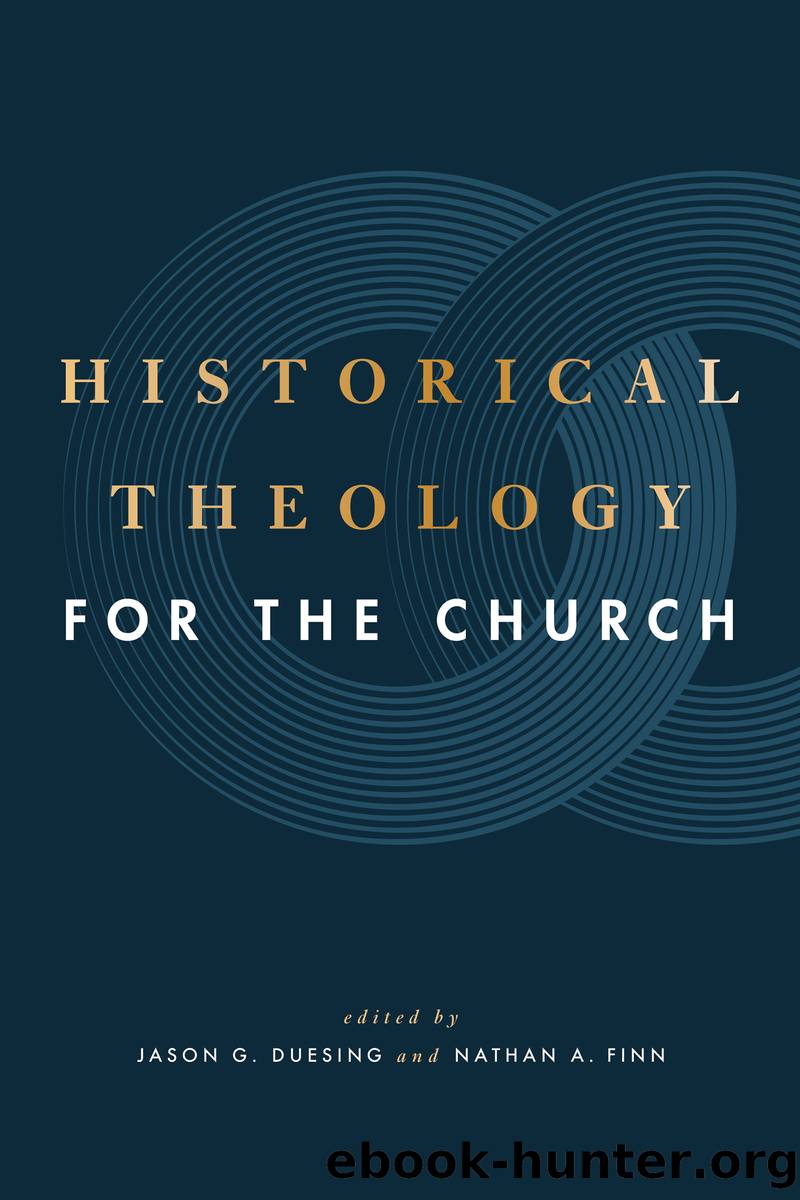Historical Theology for the Church by Duesing Jason G.;Finn Nathan A.; & Nathan A. Finn

Author:Duesing, Jason G.;Finn, Nathan A.; & Nathan A. Finn
Language: eng
Format: epub
Tags: Religion/Christian Theology/History, Religion/Christian Church/History
Publisher: B&H Publishing Group
Published: 2021-02-15T00:00:00+00:00
For the Church
The Longevity of the Formal Principle
At the start of the Reformation, Rome predicted sola scriptura would result in chaos, in which every man was his own interpreter, and, for that reason, the Reformation would be short-lived. In some cases, this prediction proved true, but sometimes it was not sola scriptura that caused dissemination, but nuda scriptura, due to the latterâs elevation of individual experience, the Spirit, or reason above the Scriptures. Historians have been slow to recognize that sola scriptura was not an Enlightenment call to the autonomous individual, a sixteenth-century precursor to Immanuel Kant or René Descartes. Such a reading falls prey to a Roman Catholic hermeneutic of the Reformation along with its aggressive propaganda, calling the match before it can begin.
By contrast, the Reformers submitted themselves to the Scriptures, exercising a hermeneutic of humility. If they were subversive, it was not because they desired to divide the churchâan interpretation as misguided as it is common. The Reformationâs subversive nature was due to the gospel Rome found offensive, and to the divinely authorized book that gave birth to that gospel. The Reformers elevated this book above all else, a maneuver Rome said was insubordinate to their infallible magisterium.
The scriptural posture of the Reformers proved anything but temporaryâat least when interpreted as they intended. Although space precludes further investigation, any student of the Reformation eager to determine how the formal principle advanced would do well to consider Lutherâs right-hand scholar, Philip Melanchthon (1497â1560) and his Loci Communes; Zwingliâs successor Heinrich Bullinger (1504â1575) and his Decades; the many catechisms and confessions that sprouted from Calvinâs Geneva with his successor Theodore Beza (1519â1605); or the way sola scriptura rooted itself in English soil through the translation of the New Testament by William Tyndale (1494â1536) and the hypnotic liturgy of Thomas Cranmer (1489â1556) in the Book of Common Prayer, the Books of Homilies, and the Thirty-Nine Articles.
These and many others were but the beginning. Century after century, sola scriptura has been the idée fixe of the Protestant mind, its foundational premise on which all its doctrines are built and established. Where it has not, Protestants have misaligned themselves with their own heritage, their own tradition. Where it has, the gospel can be heard with clarity and authority, with sufficiency and life-giving power.
Download
This site does not store any files on its server. We only index and link to content provided by other sites. Please contact the content providers to delete copyright contents if any and email us, we'll remove relevant links or contents immediately.
Signature in the Cell: DNA and the Evidence for Intelligent Design by Stephen C. Meyer(2880)
Real Sex by Lauren F. Winner(2873)
The Holy Spirit by Billy Graham(2782)
The Secret Power of Speaking God's Word by Joyce Meyer(2760)
The Gnostic Gospels by Pagels Elaine(2403)
Jesus by Paul Johnson(2232)
Devil, The by Almond Philip C(2207)
23:27 by H. L. Roberts(2144)
The Nativity by Geza Vermes(2120)
Chosen by God by R. C. Sproul(2058)
All Things New by John Eldredge(2053)
Angels of God: The Bible, the Church and the Heavenly Hosts by Mike Aquilina(1871)
Angels by Billy Graham(1846)
The Return of the Gods by Erich von Daniken(1843)
Knowing God by J.I. Packer(1727)
Jesus of Nazareth by Joseph Ratzinger(1710)
Evidence of the Afterlife by Jeffrey Long(1707)
The Gnostic Gospel of St. Thomas by Tau Malachi(1684)
How To Be Born Again by Billy Graham(1674)
